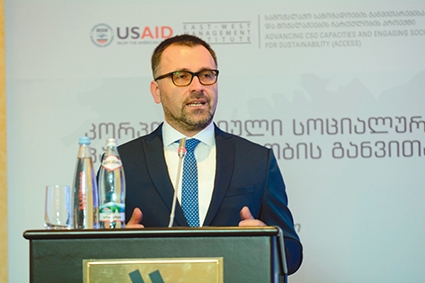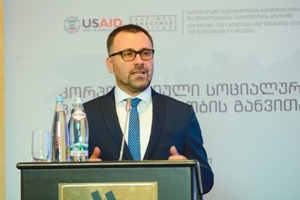CiDA Hosts International Conference on Promoting CSR in Georgia
The Civil Development Agency (CiDA) hosted a two-day international conference on Promoting Corporate Social Responsibility (CSR) in Georgia on April 22-23 in the Hotel Tbilisi Marriott, bringing together over 100 Georgian and foreign delegates around the subject of CSR in a conference co-organized by Global Compact Network Georgia and the Human Rights Secretariat of the Georgian Government Administration. Invited foreign speakers included Corporate Sustainability and Business Ethics Experts from the Headquarters of Ericsson and TeliSonera Group, Chief of Local Networks at the United Nations Global Compact, New York office, and a Delegation from the Global Compact Network Poland.
The themes of international standards in corporate sustainability, international and Georgian experience in the field, and future perspectives for the development of CSR in Georgia united dozens of speakers from different sectors to offer various approaches on the pressing topic. The conference also touched upon the topics of sustainable development, environmental issues, human rights and business environment with regard to CSR.
The conference’s core mission was that of the United Nations Global Compact, which believes that it is possible to create a sustainable and inclusive economy that delivers lasting benefits to people, communities and markets.
David Jalaghania, a Deputy Foreign Minister of Georgia, as a panel speaker underlined Georgia’s obligations with the EU in terms of CSR, emphasizing the government’s role in the process as an architect of a proper basis for the system to function well.
Applying the local Georgian examples to international CSR practice, Valeri Chekheria, a representative of the Global Compact Network in Georgia, gave the example of the Rooms Hotel chain in Georgia. Chekheria, who also heads the same chain, spoke of how the business he is involved in contributes to CSR- Rooms in Georgia is well-known for its hospitality and creativity, but it also works to help those in need. One example was the transferring of the expenses of annual Christmas gifts- given to Rooms employees and partners- into a financial contribution to the socially vulnerable.
Zsolt Dudas, International Labor Organization’s (ILO) Chief Technical Adviser in Georgia, concentrated on labor rights. Dudas incorporated child labor themes, announcing that a survey being carried out by ILO in Georgia on Child Labor will be released shortly.
Michael Cowgill, Vice President of the American Chamber of Commerce in Georgia, gave his input on investors’ expectations while seeking business opportunities in Georgia. Cowgill offered a pyramid model for business and CSR relations, naming profitability as the central topic for most businesses. According to him, when a business is viable enough and the government gives it enough opportunities to develop, it is easier to invest in philanthropy which serves the public good.
Several other speakers at the conference highlighted the importance of separating the concepts of corporate social responsibility and philanthropy. Daniel Paska, corporate sustainability expert of the Ericsson, stated that his company does not deliberately spend money on philanthropy. Instead, the company strategically decided to direct their resources to the sustainable projects, which will benefit the society as well as the business in the long term.
The audience’s attention was also directed to the topic of creating the proper conditions for physically disabled persons in Tbilisi and Georgia with Giorgi Akhmeteli, the head of ‘Accessible Environment for Everyone,’ a civil society organization that aims to protect the rights of the disabled, warning of the massive breaching of those rights in the country. The representative asked the government to oblige the private sector to fulfill their commitments in terms of giving equal opportunities to all members of society.
Corporate Social Responsibility, in other words corporate conscience or responsible business, is a form of corporate self-regulation integrated into a business model. CSR policy functions as a self-regulatory mechanism whereby a business monitors and ensures its active compliance with the spirit of the law, ethical standards and national or international norms. Sometimes, a firm's implementation of CSR goes beyond compliance and engages in actions that appear to further some social good and beyond the interests of the firm and that which is required by law.
The Conference was supported by the East-West Management Institute’s (EWMI) ACCESS project though the USAID funding. The United Nations Global Compact and the American Chamber of Commerce in Georgia partnered the event.
Zviad Adzinbaia











